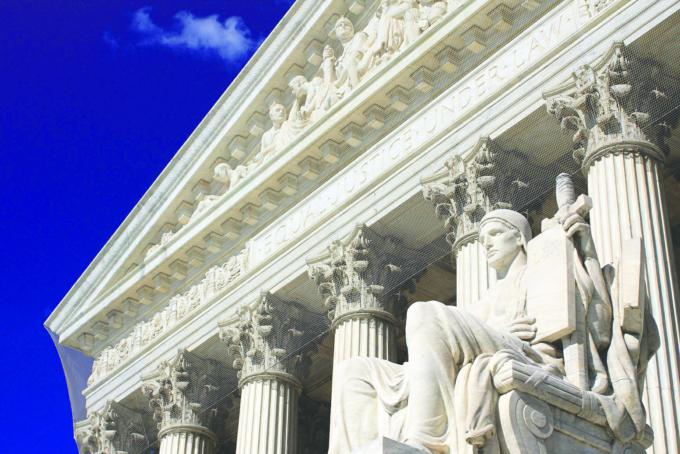
Culture
Blaine never could have imagined that one day -- more than a century later -- the Supreme Court would be in the position to erase the only thing for which he is remembered.

Carroll
The U.S. Supreme Court recently heard oral arguments on a case that could upend anti-Catholic "Blaine Amendments" found in the state constitutions of 37 states. Although language varies, state Blaine Amendments ban direct or indirect state aid to religious schools.
The specific case, Espinoza v. Montana Department of Revenue, concerns the decision of the Montana Department of Revenue to exclude scholarships to religious schools from a state-approved law that authorized tax credits to encourage donations to scholarship funds. The department claimed that religious schools could not be included because Montana's Blaine Amendment prohibited direct or indirect aid to religious schools.
The plaintiff in this case is Kendra Espinoza, a mom who says she had a "real financial struggle" paying the tuition for her two daughters at their religious school, pointing out that "I love that the school teaches the same Christian values that I teach at home."
At the center of this case is the anti-Catholic bigotry that set the stage for the adoption of the Blaine Amendments in Montana and three dozen other states.
As waves of Catholic immigrants entered the U.S. in the late 1800s, they sought their own schools as an alternative to the public schools that reflected an overt Protestant influence. As Nick Sibilla of the Institute for Justice explains, public schools at the time "typically instilled in their students a nondenominational form of Protestantism, requiring them to sing hymns, pray, and read from the King James Bible -- in direct conflict with Catholic dogma."
The then-Protestant majority -- anticipating the rising political power of Catholics -- pre-emptively sought to prevent Catholics from receiving any funding for their schools.
During the 1800s, this was a hotly contested issue. When the bishop of New York suggested in 1840 that Catholic schools receive public support, his house was burned down and troops were needed to defend the old St. Patrick's Cathedral.
In 1875, as Catholic immigration continued to grow and presaged rising political power that could threaten Protestant hegemony, James G. Blaine, then U.S. House Speaker, proposed federal legislation to ban public funds going to sectarian schools, a move clearly intended to stop Catholic demands for government support.
After his efforts failed at the federal level, the action moved to the state level, with most of the state Blaine Amendments being adopted in the last quarter of the 19th century.
James Blaine was warned by a Catholic cousin that his support for these amendments would lose him political support "among our Irish friends and Catholics." In 1884, Blaine lost the presidency to Grover Cleveland, when he lost New York State and its electoral votes by 1,149 votes, a loss widely attributed to him alienating Irish Catholic voters. He was hurt by his support for the Blaine Amendment and the use by one of his supporters of the phrase "rum, Romanism, and rebellion." The "Romanism" slur was intended to question the American patriotism of Catholic immigrants who were loyal to the pope in Rome. In the end, the anti-Catholic bigotry unleashed by presidential wannabe James G. Blaine came back to bite him.
Blaine never could have imagined that one day -- more than a century later -- the Supreme Court would be in the position to erase the only thing for which he is remembered.
Why may this happen now?
First, a string of Supreme Court decisions have expanded the ways in which government funds and tax breaks may be used to support directly or indirectly religious schools.
These notably include: Zelman v. Simmons-Harris (upholding Cleveland's school voucher program), Mueller v. Allen (affirming Minnesota's tax deductions for educational expenses, including religious tuition), Arizona Christian School Tuition Scholarship Organization v. Winn (upholding a state scholarship tax credit program on Establishment Clause grounds), and Trinity Lutheran Church v. Comer (stipulating that government programs could not exclude religious providers). Overturning state Blaine Amendments would continue this trend.
Second, the Trinity Lutheran decision was approved by a 7-2 vote, suggesting the evolution of support for government aid for religious schools if supplied within the context of a neutral program. Significantly, this decision drew the support of Justices Stephen Breyer and Elena Kagan, who are not part of the 5-4 Republican-appointed majority on the Court.
Third, in multiple decisions since 2000, at least seven liberal and conservative Supreme Court judges alike explicitly have criticized Blaine Amendments, including current justices conservative Clarence Thomas and liberal Stephen Breyer. In 2002, the plurality opinion in Mitchell v. Helms noted: "Consideration of the (Blaine) amendment arose at a time of pervasive hostility to the Catholic Church and to Catholics in general, and it was an open secret that 'sectarian' was code for 'Catholic.'" The newest Justice -- Brett Kavanaugh -- also spoke publicly about the discriminatory history of Blaine Amendments before his appointment.
Further, five of the current nine Supreme Court members are Catholic (Alito, Kavanaugh, Roberts, Sotomayor, and Thomas) and a sixth was raised Catholic (Neil Gorsuch). All presumably are well versed in the anti-Catholic history of the Blaine Amendment.
If the U.S. Supreme Court strikes down state Blaine Amendments this term, school-choice efforts in the affected states may be pursued with renewed vigor. A favorable U.S. Supreme Court decision won't remove obvious political obstacles -- teacher union opposition being the foremost -- but governors and state legislators will no longer be able to claim their hands are tied by the Blaine Amendments in their states.
- Thomas Carroll is superintendent of schools for the Archdiocese of Boston.
Recent articles in the Culture & Events section
-
'Dignitas' and the mediaRussell Shaw
-
Scripture Reflection for April 14, 2024, Third Sunday of EasterDeacon Greg Kandra
-
St. Helena's House is established in the South EndThomas Lester
-
Is this synodality?Russell Shaw
-
Poking the hornet's nest of IVFFather Tadeusz Pacholczyk


















